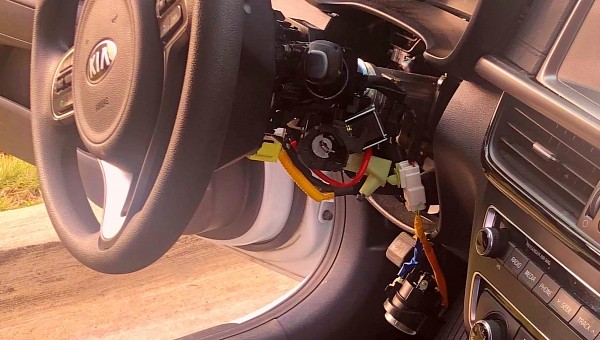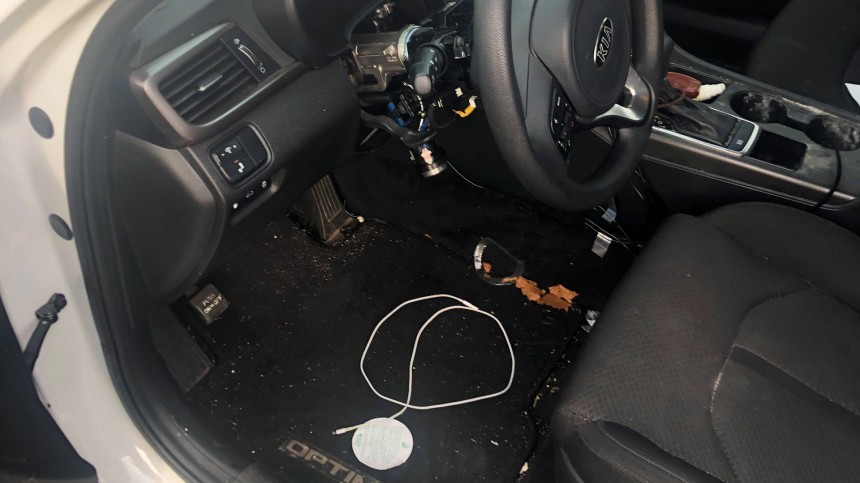When you’re a teenager or even an only 11 or 12-year-old kid, stealing a car might seem like fun if it’s not perceived as a wrongdoing. That’s the case of several videos on TikTok with tens of millions of views of teenagers explaining how to hack some KIA-Hyundai models and with others recklessly driving the stolen cars.
In movies, stealing a car is very simple: they just cut some wires underneath the steering wheel and spark some connections or simply stab the ignition switch with a screwdriver, and they are gone with the car in no time – or in less than 60 seconds if you remember Nicolas Cage’s character.
Today, you only need a USB cable and a screwdriver to steal several KIA and Hyundai models made between 2010 and 2021. These cars don’t have a push button to start, nor anti-theft computer chips in their key systems, or even engine immobilizers.
Thus, some hackers found a way to hotwire a car’s engine, and this trick became viral on TikTok. For instance, one such video has already surpassed 30 million views. It shouldn’t come as a surprise that even 11 or 12-year-old kids were stealing and joyriding cars of the Korean manufacturer.
For most of the teenagers that were caught by police, this practice is like playing real-life Grand Theft Auto. The problem is reckless driving almost always leads to damages and injuries or even fatalities. In October 2022, a horrible accident took the life of four teenagers between 14 and 19 years old who apparently stole a car in Buffalo, NY, using the trick from TikTok videos.
Also, breaking the windows of cars and destroying ignition hubs are costly for owners. Not to mention the fines and repair costs borne by the little wrongdoers’ parents, nor the consequences of such behavior on a teenager’s future. Unless they really want a criminal future, like in movies or console games.
Data from the Insurance Institute for Highway Safety's Highway Loss Data Institute (HLDI) showed in 2022 that the theft claim frequency for KIAs and Hyundais made between 2015 and 2019 was 80% higher than the average of all other brands.
This study led to several lawsuits from owners accusing manufacturers of the cars being too easy to steal. For instance, a class-action lawsuit in September stated that Korean carmakers were valuing profits over the safety and security of their customers.
But, as you know, trials take time. In the first couple of weeks of 2023, more than one-sixth of all car thefts in many U.S. cities are KIA and Hyundai models. In some regions, stolen KIAs and Hyundais are more than half of the total cars stolen at the beginning of the year.
The vast majority of stolen models are KIAs built between 2011 to 2021, and Hyundais built from 2015 to 2021. According to HLDI, in 2015, 96% of the vehicles sold by other automakers had immobilizers, but only 26% of KIAs and Hyundais did.
Since November 2021, Hyundai made engine immobilizers standard for all new vehicles, while KIA applied the same at the beginning of 2022. But for the cars before 2021 that lack standard security devices, there are no easy solutions.
Hyundai stated that “owners may bring their vehicles to a local Hyundai dealer for the purchase and installation of a customized security kit.” Both Hyundai and KIA are providing “free steering wheel locks available to customers through interested local law enforcement agencies, subject to available supply.”
Some lawsuits are trying to also hold responsible social media platforms like TikTok, YouTube, or Instagram, where these videos are adding up. But there’s little chance for the victims to actually make these platforms accountable.
For instance, TikTok released a statement in line with its terms and conditions, saying the videos violate its policies and will be removed if found on the platform. Moreover, it has begun labeling such videos with the message “Participating in this activity could result in you or others getting hurt.”
It's something like the warnings on the packs of cigarettes, that most smokers don’t even bother to read anymore. And it’s not clear yet how these platforms could be legally forced to avoid publishing such videos.
In the meantime, police forces all over the country “encourage residents to remove charger cords from their KIA and Hyundai vehicles, or to purchase a brake pedal club, alarm or other theft prevention device.”
The recent KIA-Hyundai car theft trend, based on TikTok viral videos, is just another blow to the industry, after more famous cases of hackers hacking Teslas or even a Jeep while it was driving down a highway.
Only this time, instead of worries about electronic devices not being secure enough for cybercriminals, the problem is lack of electronic devices makes the cars too easy to steal. By virtually anyone who has access to a TikTok so-called challenge video, no matter the age.
And this is probably the most sensitive part of this story – knowing that your kids can put into practice wrongdoings that society and authorities should prevent. This surely will be on the agenda of those who are rightfully trying to compel social media to truly be responsible.
Today, you only need a USB cable and a screwdriver to steal several KIA and Hyundai models made between 2010 and 2021. These cars don’t have a push button to start, nor anti-theft computer chips in their key systems, or even engine immobilizers.
Thus, some hackers found a way to hotwire a car’s engine, and this trick became viral on TikTok. For instance, one such video has already surpassed 30 million views. It shouldn’t come as a surprise that even 11 or 12-year-old kids were stealing and joyriding cars of the Korean manufacturer.
For most of the teenagers that were caught by police, this practice is like playing real-life Grand Theft Auto. The problem is reckless driving almost always leads to damages and injuries or even fatalities. In October 2022, a horrible accident took the life of four teenagers between 14 and 19 years old who apparently stole a car in Buffalo, NY, using the trick from TikTok videos.
Data from the Insurance Institute for Highway Safety's Highway Loss Data Institute (HLDI) showed in 2022 that the theft claim frequency for KIAs and Hyundais made between 2015 and 2019 was 80% higher than the average of all other brands.
This study led to several lawsuits from owners accusing manufacturers of the cars being too easy to steal. For instance, a class-action lawsuit in September stated that Korean carmakers were valuing profits over the safety and security of their customers.
But, as you know, trials take time. In the first couple of weeks of 2023, more than one-sixth of all car thefts in many U.S. cities are KIA and Hyundai models. In some regions, stolen KIAs and Hyundais are more than half of the total cars stolen at the beginning of the year.
The vast majority of stolen models are KIAs built between 2011 to 2021, and Hyundais built from 2015 to 2021. According to HLDI, in 2015, 96% of the vehicles sold by other automakers had immobilizers, but only 26% of KIAs and Hyundais did.
Hyundai stated that “owners may bring their vehicles to a local Hyundai dealer for the purchase and installation of a customized security kit.” Both Hyundai and KIA are providing “free steering wheel locks available to customers through interested local law enforcement agencies, subject to available supply.”
Some lawsuits are trying to also hold responsible social media platforms like TikTok, YouTube, or Instagram, where these videos are adding up. But there’s little chance for the victims to actually make these platforms accountable.
For instance, TikTok released a statement in line with its terms and conditions, saying the videos violate its policies and will be removed if found on the platform. Moreover, it has begun labeling such videos with the message “Participating in this activity could result in you or others getting hurt.”
It's something like the warnings on the packs of cigarettes, that most smokers don’t even bother to read anymore. And it’s not clear yet how these platforms could be legally forced to avoid publishing such videos.
In the meantime, police forces all over the country “encourage residents to remove charger cords from their KIA and Hyundai vehicles, or to purchase a brake pedal club, alarm or other theft prevention device.”
The recent KIA-Hyundai car theft trend, based on TikTok viral videos, is just another blow to the industry, after more famous cases of hackers hacking Teslas or even a Jeep while it was driving down a highway.
Only this time, instead of worries about electronic devices not being secure enough for cybercriminals, the problem is lack of electronic devices makes the cars too easy to steal. By virtually anyone who has access to a TikTok so-called challenge video, no matter the age.
And this is probably the most sensitive part of this story – knowing that your kids can put into practice wrongdoings that society and authorities should prevent. This surely will be on the agenda of those who are rightfully trying to compel social media to truly be responsible.








